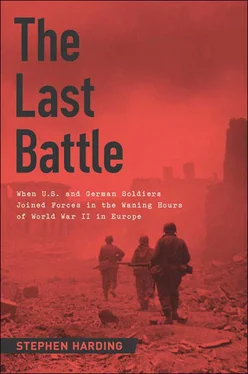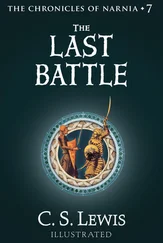Just after dawn on April 30, Daladier, Gamelin, and Jouhaux said their good-byes to Blum and then were escorted by SS troops to the compound’s main gate. The plan soon changed, however, for Buchenwald’s assistant commandant arrived with news that their departure for Tyrol had been postponed, though he gave no reason. Finally, on the morning of May 2, Daladier and his companions stepped into a Mercedes staff car and, with their SS escort, set off for Munich and, ultimately, Schloss Itter.
The drive south was an eye-opening experience for the three Frenchmen, for even after nearly four years of war the roads of central and southern Germany were alive with military traffic. Several times field police soldiers [62] 15. Known in German as Feldgendarmerie, these troops were widely hated within the Wehrmacht because of their habit of summarily executing any soldier they believed to be a deserter or malingerer. They were scornfully referred to as kettenhunde , or chained dogs, because of the gorgets (a flat metal crescent suspended around their necks on a light chain) that were the emblems of their authority.
waved the staff car and its escorts to the side of the road so long convoys of troop trucks, interspersed with vehicles towing artillery pieces and multibarreled rocket launchers, could move past unimpeded. Despite clear evidence of Allied air attacks—destroyed and damaged buildings, downed bridges, and vast stretches of heavily cratered landscape—it was depressingly obvious to the Frenchmen that Germany was far from beaten.
–———–
MAURICE GAMELIN WAS PERHAPS the most deeply affected by the seemingly endless display of the Wehrmacht’s combat power. The diminutive general—he stood barely five feet four inches tall—had spent more than fifty of his seventy-one years as an officer in his nation’s army, a force whose primary raison d’être for at least a generation had been to prevent the exact military catastrophe that had overtaken France in June 1940. And the fact that most of his countrymen seemed to believe that he was solely and personally responsible for France’s defeat and capitulation would have been a bitter pill to swallow for the erstwhile supreme commander of all French armed forces.
Gamelin’s rise to his nation’s highest military post seems, in retrospect, to have been almost preordained. He was born on September 20, 1872, in his family’s ornate home on Paris’s Boulevard Saint-Germain, literally just across the street from the French ministry of war. His father, Zéphyrin Gamelin, was a general and the army’s controller-general, or senior administrator. [63] 16. For an in-depth discussion of Gamelin’s family background and military connections, see Martin S. Alexander’s excellent The Republic in Danger .
The younger Gamelin was educated at an elite Paris school, where he developed a deep and lifelong interest in art and philosophy, and in 1891 he entered the École Spéciale Militaire de Saint-Cyr, France’s foremost military academy. A gifted student, he graduated at the top of his 449-member class in 1893 and was commissioned a second lieutenant.
Over the following two decades Gamelin proved himself to be both an excellent staff officer and a tactical commander of rare skill. After his initial field assignment in French North Africa, he ascended steadily through the ranks, along the way acquiring such powerful mentors as General Joseph Joffre, commander in chief of the French army in the years leading up to World War I. By November 1913 he was a member of the General Staff’s operations bureau. In that position Gamelin helped develop the mobilization plan the army would put into motion in the event of war, and in March 1914 he was tapped to join Joffre’s personal staff.
While World War I was a bloody tragedy for France, it was a personal triumph for Gamelin. Alternating between important staff positions and field commands, he built a solid reputation as an innovative, highly capable, and politically astute officer who cared about his men and maintained his composure no matter what surprises were thrown at him. The best illustration of the latter attribute was his brilliant command of the 9th Infantry Division during the Germans’ massive spring offensive in 1918. Initially confronted by six enemy divisions, Gamelin ordered a fighting withdrawal that saved his division and, ultimately, allowed him to stop the German advance along the River Oise.
By the time the war ended in 1918, Gamelin was a brigadier general with a chest full of medals—both French and foreign. His wartime successes ensured his continued ascent in the postwar world, and he burnished his already lofty reputation with a series of highly successful assignments. He led the French military mission to Brazil from 1919 to 1925, commanded all French forces in Syria from 1925 to 1928, [64] 17. Gamelin also ruthlessly put down a revolt by restive Druze tribes in the Syrian hill country. According to a Time magazine account (Aug. 14, 1939), Gamelin was present when French aircraft and artillery killed more than 1,400 civilians in Damascus.
and in 1930 was named deputy to General Maxime Weygand, chief of the army general staff. Prime Minister André Tardieu intended Gamelin to be a forward-thinking and relatively liberal counterweight—and eventual successor—to the vastly more conservative Weygand. While the latter favored the complete overhaul and mechanization of the French army—and was especially fervent about the need to create independent armored units equipped with state-of-the-art tanks [65] 18. Singer, Maxime Weygand , 65. This book is an excellent in-depth look at Weygand’s life and career.
—his notoriously abrasive personality and penchant for publicly belittling politicians foolish enough to disagree with him often negated his sincere efforts to improve his nation’s military readiness.
The Gamelin-Weygand partnership began well; indeed, soon after the former became his assistant in 1930, Weygand referred to him as “a colleague of peerless value.” [66] 19. Alexander, The Republic in Danger , 30.
Both officers were extremely wary of Germany’s growing military might, and they agreed wholeheartedly on the need to modernize the French army and construct a line of fortifications along the nation’s eastern frontier. But the honeymoon didn’t last long; in February 1931 Weygand became the army’s inspector general, and Gamelin replaced him as chief of staff, and from that point on the two men clashed with increasing frequency over the course, and cost, of France’s military rejuvenation.
For his part, the arch-conservative Weygand found it virtually impossible to deal with the series of leftist prime ministers who came to power from 1932 onward. He believed their internationalist and optimistic views of foreign relations to be naive and possibly subversive, and he strongly felt that their failure to adequately fund the large-scale weapon purchases he considered essential was making France increasingly vulnerable. Though Gamelin agreed with many of Weygand’s proposals, he also knew that alienating the politicians would be counterproductive. Gamelin was thus conciliatory where Weygand was confrontational, hoping to achieve through logic, persuasion, and compromise what would almost certainly not be gained through acrimonious intransigence. This point of view put him at odds with Weygand, who increasingly saw Gamelin as a dangerously indecisive leader whose beliefs and methods—which Weygand saw as holdovers from Gamelin’s World War I service—were perpetuating the army’s weakness and vastly increasing its risks of defeat in any conflict with Germany.
Gamelin’s point of view ultimately prevailed for the simple reason that in January 1935 Weygand reached the mandatory retirement age of sixty-eight. Upon his departure, Gamelin replaced him not only as army chief of staff but also as both army inspector general and vice president of the Supreme War Council. [67] 20. Conseil Supérieur de la Guerre, France’s highest military council, headed by the country’s prime minister.
The latter position made Gamelin the peacetime deputy to the minister of war, Louis Maurin. In wartime, the council’s vice president automatically became the commander of all French field armies.
Читать дальше












